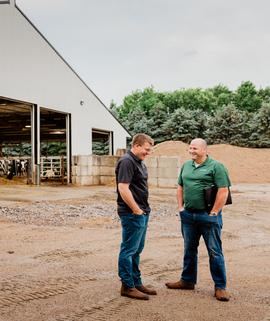Maximize Year-End Financials: Tax Planning for Dairy Farms
As the year comes to a close, it's crucial for dairy farmers to evaluate their year-end financials and develop a solid farm tax planning strategy. Taking proactive steps now can reduce your tax liability, increase possible credits and set the stage for smoother financial management in the coming year.
Here are some key strategies to consider:
1. Prepay Farm Expenses
One effective way to manage your tax consequences is by prepaying certain farm expenses—like feed, fertilizer, chemicals and seed. By doing so, you might benefit from possible tax savings while taking advantage of cash discounts. Prepaying could ease your financial burden when preparing for next season, helping to lock in prices before potential increases.
2. Leverage Section 179 & Bonus Depreciation
The direct expensing limit, per Section 179, for allows for the expensing of up to $1,220,000 in capital purchases for 2024. The Section 179 deduction dollar limit is reduced by $1 for every $1 of investment over a threshold of $3,050,000 for 2024.
Since the like-kind exchange of personal property ended in 2017, the 179 election has been used more frequently to offset the gain reported on trade-ins. This can reduce self-employment income by using the 179 election to lower Schedule F income and offset gains reported as capital gains on trade-ins. While this saves on self-employment tax, there are some potential consequences, such as not contributing enough to Social Security to maintain credits for disability, retirement and Medicare eligibility. Without self-employment income, you may also miss out on certain credits.
Bonus depreciation is another tool in your tax-planning toolbox, especially with the allowance decreasing from 60% in 2024 to 40% in 2025. Bonus depreciation applies to property with a General Depreciation System (GDS) recovery period of 20 years or less, so nearly all depreciable agricultural property is eligible. The 179 deduction is taken before bonus depreciation. However, bonus depreciation is less flexible than the 179 deduction. It’s a class-by-class election, meaning if you elect to use bonus deprecation, all the assets you purchased in a specific class – such as five-year property – must use bonus deprecation. The advantage of the 179 deduction is that you can decide how much depreciation is needed to achieve your desired tax outcome.
3. Understand the Long-Term Impacts
It's important to remember that reducing your taxable income today can increase future liabilities. If you apply the full depreciation on assets financed through loans, you may be left with a larger tax burden in the coming years when paying off the principal. This can be especially challenging during transition planning, where the liabilities may outweigh the basis in assets being passed down. Make sure your current actions don’t negatively impact the future health of your business.
Note that some states do not follow federal rules for the 179 deduction or bonus depreciation, so it’s important to be aware of how this may impact your state return.
4. Don’t Overlook Marketplace Health Insurance Planning
In recent years, tax planning has increasingly incorporated considerations around Marketplace health insurance. Since your credit is based on adjusted gross income, adjusting your financial strategy could help you obtain more affordable health insurance. Health costs are rising, and managing this effectively can make a significant difference in both your business and personal finances.
5. Take Advantage of Tax Credits
Don’t forget to explore available tax credits, especially those that benefit farmers with self-employment income, such as the Earned Income Credit. In some cases, it may make sense to increase your income strategically to qualify for these credits, which can reduce your overall tax burden. Knowing where to find additional savings could help you keep more of your hard-earned revenue.
Looking for personalized advice on your farm's tax situation? Connect with a Compeer Financial consultant who can help you develop a tailored year-end tax strategy.
Farm Tax Services
Compeer Financial provides tax and accounting services to clients who live and work in rural America.
Farm Succession Planning: Vital For a Dairy’…
Intertwining economics with emotion, kicking off succession planning conversations can feel crippling. Taking action today benefits all parties into the future.
Land & Dairy Farm Appraisals: Navigating Mar…
A recent Upper Midwest farmland and dairy farm market analysis explores trends, factors influencing values and the impact on appraisals that need considered.
